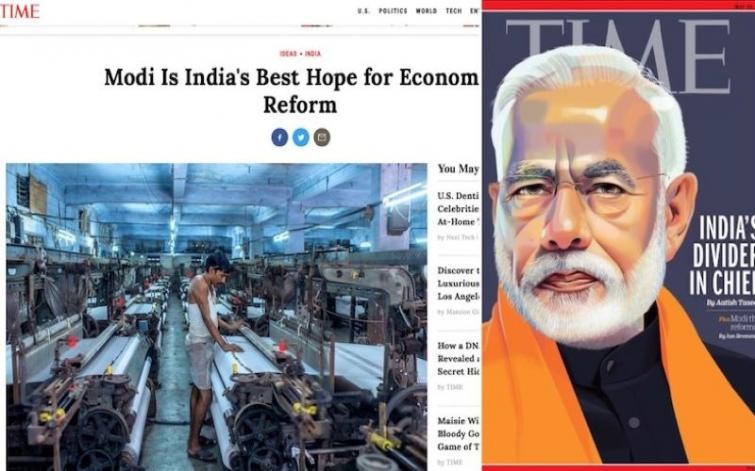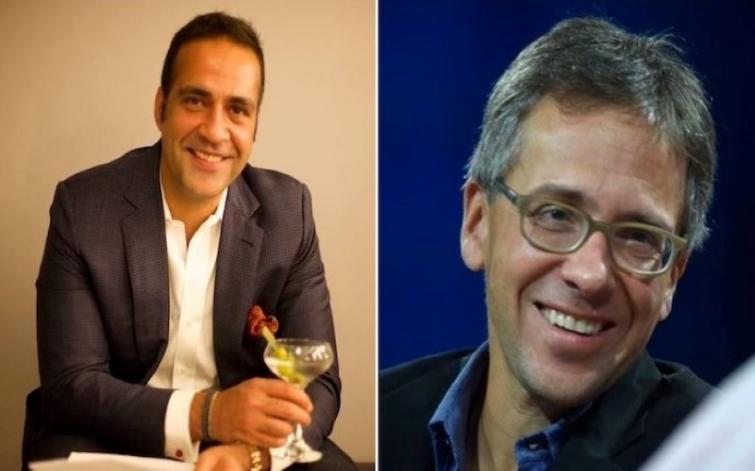
With a 'Divider Modi' cover story by late Pak politician's son, TIME's second article hails Indian PM as 'best hope for economic reform'
While a TIME Magazine's cover story- written by Aatish Taseer- painted Prime Minister Narendra Modi as the country's "Divider in chief", a different article of the same publication hailed the politician as the "best hope for economic reform" in the south Asian country.
While Aatish Taseer, the British-born writer-journalist, who is the son of outspoken Indian journalist Tavleen Singh and late Pakistani politician and businessman Salmaan Taseer, wondered if India would be able to ‘endure another five years of a Modi government', Time foreign affairs columnist and editor-at-large Ian Bremmer, in his article, perceived Modi with a lot of positives at a time the ruling Bharatiya Janata Party (BJP) leader is facing severe criticisms from India's main opposition parties.
Bremmer termed the implementation of Goods and Services Tax (GST), which diluted multiple and complex tax systems in India, as "historic accomplishment".
"Thanks to the Goods and Services Tax enacted in 2017, Modi has streamlined an enormously complex system of state and federal tax collection, broadening the tax base and sharply reducing the amount of money lost to fraud. That’s a historic accomplishment in a country with so many development needs.," the article reads.
The writer has also attributed the infrastructural development along with the Aadhaar card regime to the ruling dispensation saying, "Modi has directed unprecedented amounts of money toward the country’s seemingly endless need for new infrastructure. Construction of roads, highways, public transport and airports have sharply increased the country’s long-term economic potential. Although the process remains unfinished, the government has also brought electricity to remote villages that have never had it, a boon for economic potential, public safety and basic quality of life.
The BJP-led government has also expanded a biometric identification system, begun under the previous Congress Party–led government, that has already taken iris scans and fingerprints from well over a billion people to help citizens prove who they are so they can receive services.
It has provided bank accounts for 300 million people who have never had them, creating new opportunities for these people to access credit and state subsidies. It also brings them into the formal economy to potentially make the government more responsive to their needs. The government says these measures have cut sharply into waste and fraud within India’s welfare system, allowing the state to provide more and better services at a much lower cost."
Quite contrary to the words, TIME Magazine's cover story written by Taseer stated India is more divided as a nation than ever under Modi.
The story says, "The nation’s most basic norms, such as the character of the Indian state, its founding fathers, the place of minorities and its institutions, from universities to corporate houses to the media, were shown to be severely distrusted. The cherished achievements of independent India–secularism, liberalism, a free press–came to be seen in the eyes of many as part of a grand conspiracy in which a deracinated Hindu elite, in cahoots with minorities from the monotheistic faiths, such as Christianity and Islam, maintained its dominion over India’s Hindu majority."
The country is gearing up for the last couple of phases of the Lok Sabha polls, which will end on May 19. BJP, which stormed into power five years ago, is fighting the battle to retain its power under the leadership of Prime Minister Narendra Modi.
In the last elections, BJP had got 282 out of 543 seats though the party has lost a few in recent by-elections.
Who are the writers for the Time magazine stories?
Ian Arthur Bremmer is a foreign affairs columnist and editor-at-large at TIME. He is an American political scientist specializing in U.S. foreign policy, states in transition, and global political risk. He founded Eurasia Group, a political risk research and consulting firm. He wrote books like The J Curve, Every Nation for Itself, and the New York Times bestselling Us vs. Them: The Failure of Globalism. He is foreign affairs columnist and editor-at-large at Time. In 2013, he was named professor at New York University.

Aatish Taseer is a novelist and journalist who wrote books like The Twice-Born: Life and Death on the Ganges. Born in London to a married Pakistani politician Salman Taseer and his Indian mother Tavleen Singh, a journalist, Taseer grew up in New Delhi and later studied at Amherst College in Massachusetts. Taseer had earlier hogged limelight writing in Vanity Fair about his own affair with a British royal -Lady Gabriella Windsor- who later dumped him to marry her long-time love. Surprisingly, he later married American lawyer Ryan Davis and called him his husband and championed gay rights.
Images: Time Screenshots and Facebook of Writers
Support Our Journalism
We cannot do without you.. your contribution supports unbiased journalism
IBNS is not driven by any ism- not wokeism, not racism, not skewed secularism, not hyper right-wing or left liberal ideals, nor by any hardline religious beliefs or hyper nationalism. We want to serve you good old objective news, as they are. We do not judge or preach. We let people decide for themselves. We only try to present factual and well-sourced news.







